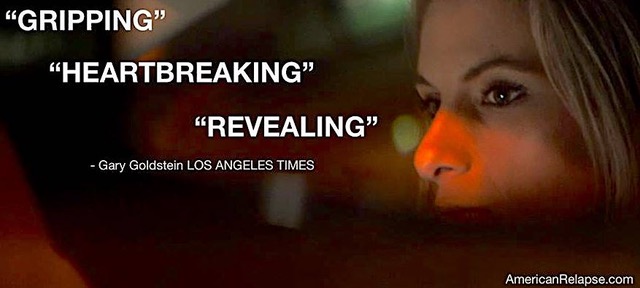FILM REVIEW – American Relapse

by Burl Barer, Member of Writers in Treatment Advisory Board
With a film such as AMERICAN RELAPSE, it is difficult to separate the technical and artistic quality of this documentary from the setting, the characters, and the film’s overall impact.
Being a documentary, there isn’t a cleverly drafted screenplay replete with characters both static and dynamic. We see 72 hours in the lives of two altruistic “junkie hunters” who comb the streets and alleys of Florida’s Delray Beach seeking heroin addicts and attempting to get them into detox.
From a filmmaking perspective, American Relapse is wonderfully constructed, visually impressive, and perhaps a few minutes too long for those who can only tolerate so much on-screen pain, anguish and despair. Fascinating facts about the “rehab racket” of overcharging insurance companies, and other corrupt practices are provided in a most clever and engaging manner without breaking the essential narrative flow, such as it is.
This is not a documentary where you come out whistling the theme, nor does the film experience impart strength nor give hope. A cynically informed gambling game took place in the audience: “Who is going to die?” Someone always ODs in addiction documentaries, but it was difficult to feel connected to the deceased because we never were given the opportunity to connect to the person behind the glazed eyes, slack jaw, and slurred speech.
The film features no recognized experts on addiction offering views and perspectives on how to help the audience understand what’s transpiring – there is no informed, educated sober sense of perspective. The addict’s perspective makes only simplistic sense. Get high, get numb. Stay alive to do it again, This isn’t a film that will help you understand the medical condition of physical addiction, and it won’t help you understand why these people are not eager to get free from their addiction.
There is distorted sense of security in familiar pain. The addicted individual knows both the euphoria of the drug and the pain and despair of potentially fatal withdrawal. Don’t be fooled — addicted individuals are not stupid, and their very intelligence alerts them to the tragic reality that even if they get clean, their life may never get any better. They have no recent resume of employment or accomplishments, no letters of recommendation, no backup brigade of loyal friends and family cheering them on to victory. Their past refuses to stay put and potentially threatens to haunt their future. Why feel hopeless when you can feel euphoric and exempt from experiencing your own life?
The filmmakers wisely decided to make no editorial comments. There are no positions taken, no soapbox mounted, no pre-determined message, no “pills in the jam.” As Fred Allen said, “If you want to send a message, use Western Union.” What you get is real life, real addiction none of it is heart warming.
There is not one person — not the “good junkie hunters” nor the addicts whose suffering is relentlessly portrayed- who holds out the promise of a life worth living, The female protagonist, Allie, is unhappy, proclaims that she hates her life, her job, the environment BUT she enjoys the chaos of her life and the excitement of the drug addict sub-culture without having to be in active addiction. Her significant other does nothing of significance, treats her as if she is a servant, and relapses with unpleasant regularity. Her male partner in the “Junkie Hunting” business, Frankie, has his own issues and is still as sick as his secrets.
Allie and Frankie make reference to the “12-Steps” but there is no indication that they actually work the steps, have sponsors, or go to meetings. It appears that they have reinterpreted their employment as their “program” of recovery. This is a common error found in the treatment field and the reason relapse is so common among drug and alcohol counselors. Helping others get into a treatment center doesn’t make you immune from the lure of incomplete memories that only glorify the past drug experiences.
AMERICAN RELAPSE is well constructed, well shot, brutally honest about dishonesty, and painful to watch. If this film’s intent is to educate those who know little of addiction and stimulate a sense of compassion for the Heroin addicts living on the street who may not live beyond today, it only partially succeeds in the realm of education, but not at all when it comes to compassion. I have known people who became addicted to opiates. I have helped them detox in my own home (dangerous), and have delivered a few to medically assisted detox centers, but this film was not able to let me experience, know and/or relate to the real person living that condition of addiction.
Distributor: Gravitas Ventures
Directors: Adam Linkenhelt, Pat McGee
Producers: Devon Collins, Terry Hahin, Dennis Hill, Adam Linkenhelt
Executive producers: Ian Manheimer, Jaime Manheimer, Pat McGee, Stacy McPeak
Director of photography: Michael Goodman
Composer: Dennis Hill
105 minutes
BB
CLICK TO PURCHASE AMERICAN RELAPSE
–––––


